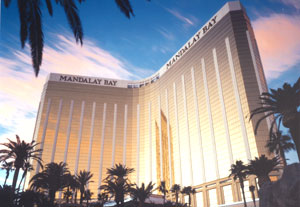MGM Resorts International took it on the chops from Deutsche Bank analyst Carlo Santarelli, who said of 4Q16 results that they “were undoubtedly surprising, in the wrong direction in this instance as property EBITDA fell well short of forecasts, most  notably on the Strip.” Mandalay Bay and MGM Grand especially suffered, as most of the increases were at low-end properties — although Bellagio had a $21 million boost. So either players are saving their pennies or they’re choosing to stay at the very top of the MGM food chain and largely ignoring the properties in between the extremes. (Due to being jointly owned with Dubai World, megaresort Aria was excluded from the comparisons.) MGM’s REIT was also a disappointment, contributing only $30 million. “Management noted convention softness, sports book hold … were a hindrance and we believe the shift from convention to leisure/casino channels at Mandalay/MGM Grand was more painful than expected,” Santarelli elaborated.
notably on the Strip.” Mandalay Bay and MGM Grand especially suffered, as most of the increases were at low-end properties — although Bellagio had a $21 million boost. So either players are saving their pennies or they’re choosing to stay at the very top of the MGM food chain and largely ignoring the properties in between the extremes. (Due to being jointly owned with Dubai World, megaresort Aria was excluded from the comparisons.) MGM’s REIT was also a disappointment, contributing only $30 million. “Management noted convention softness, sports book hold … were a hindrance and we believe the shift from convention to leisure/casino channels at Mandalay/MGM Grand was more painful than expected,” Santarelli elaborated.
For those looking for a silver lining, MGM Grand Paradise in Macao beat Wall Street expectations and MGM National Harbor did almost twice the amount of return on investment that Santarelli projected. Wall Street expected $406 million in cash flow from MGM’s Strip properties and the company delivered only $355 million. JP Morgan analyst Joseph Greff termed the outcome “genuinely surprising.” Greff was a stern judge of MGM’s portfolio, expecting $7 million more from Macao, $8 million more from sundry regional properties and $34 million more from the Strip. The Las Vegas Review-Journal spun the results as “rosy,” emphasizing its 89% occupancy rate in Las Vegas and $70 million profit. One unquestioned coup for MGM was the inking of a multi-year pact with Microsoft to fold four Microsoft events into a single, 30,000-attendee super convention. The exact length of the deal wasn’t released but it’s definitely headline news for MGM.
* Just because casinos are illegal in Georgia, it doesn’t mean they don’t exist. Police raided two convenience stores owned by Khubaib Hussain of Marietta and found black-market gambling machines on the premises. They also confiscated luxury vehicles, cash, jewelry and more. Police reported that the casinos had been making payouts as high as $5,000. The news comes at a bad time, just as Gov. Nathan Deal (R) is warming to the idea of casino legalization.
* Boyd Gaming is putting $400 million into Wilton Rancheria‘s proposed Elk Grove casino. However, as Boyd Executive Vice President Brian Larson said, “There’s still a lot more to do” … such as reconciling the planned use of the 100 acres for gaming with a previous agreement by the Elk Grove City Council with the Howard Hughes Corp. to develop the land for retail. Also, no gaming compact has been negotiated with the State of California yet. At least, in a surprise move, the Trump administration placed the land into trust for the Wilton Rancheria, clearing one obstacle from its path.
* How big could Internet gambling be in the U.S.? Let’s look at the United Kingdom, where it represents one-third of all wagering. That’s $5.6 billion — from a much smaller country. Sports betting alone accounts for slightly more than a third of the total. Politicians looking for a ready revenue source would do well to consider those figures.
* You’d have to be pretty desperate to have a fiddle if you went to Goa to gamble in any of its 16 casinos. Nonetheless, Goa officials think they can afford to be picky. Draft regulations would prohibit native Goans from setting foot in a casino unless they work there.


[…] I found the information about the Borgata in Atlantic City more useful this time around. The great Stiffs and Georges blog has some unbiased thoughts on the earnings information that mirror my […]